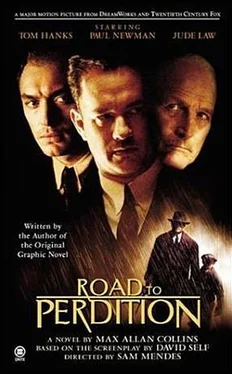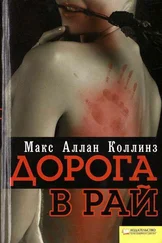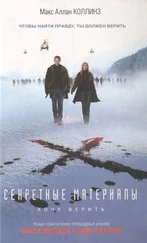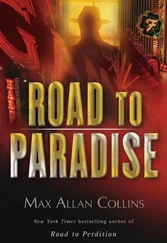His father replied, “Mama knows that I love Mr. Looney like a father. She knows that when we had nothing, he gave us a home. A life. She knows we owe him everything... Understand, son?”
Michael nodded.
“Come on. Let’s go inside.”
“But Mama... ”
“I don’t think they’re back from the concert, yet.”
The concert — he’d forgotten. Real life, day-to-day activity, the little things that made up a normal life... the boy had forgotten all about the wonderful ordinary life he’d been living. Could he go back to that life? Could life ever be normal? Could he be an ordinary boy again?
Mother and Peter were not home yet. Papa put him down in the kitchen, and Michael could walk, with just a tiny limp. His father offered to carry him up the stairs, but the boy shook his head. The clock said it was surprisingly early, but all Michael O’Sullivan, Jr., wanted to do was crawl in his warm bed, between comforter and covers, where it would be toasty and safe.
His father looked in on him, but did not tuck him in.
“Goodnight, son,” was all he said, from the doorway.
Michael said, “Night,” and tried to go sleep, thinking he would, right away, as tired as he was.
But sleep did not come. Life wasn’t that easy, anymore. And he lay awake, hands balled into fists outside the covers, as he stared up at the ceiling; the weather — snow, rain — reflecting weirdly, made shapes, strange drifting shapes he couldn’t make out. He wasn’t sure he wanted to, but he couldn’t stop looking at them.
He was still awake when Mama — leading Peter in by the hand, his brother still dressed up for the concert (Mama, too) — whispered to her youngest boy, “Get dressed for bed, honey... quiet, now. You’ll wake Michael.”
And as the giggling Peter — Mama couldn’t know the anticipation Michael’s brother was experiencing, wanting to hear the scoop on the “mission” — got into his jammies, their mother crossed to her older boy’s bed. She leaned in, to tuck him in, and he couldn’t help himself.
Michael sat up and threw himself at his mother, hugging her tight, very tight, wanting to crawl inside her and hide.
Annie O’Sullivan, caught utterly off-guard, said, “Oh, dear,” and held him, patting him, kissing his cheek, allowing the boy to disappear in her arms. She could sense his distress, could feel his fear, and said, “It’s just a nightmare, dear.”
“Oh yes, Mama,” the boy said, “it’s a nightmare... a nightmare.”
When her younger son was in bed, she kissed Michael’s forehead, tucked him in, and said, “You’re safe, Mama’s home, Mama’s home.” Then, after tucking in the younger boy, she slipped out.
Annie looked for her husband, but he was not around — the light in the garage was on. She did not make the leap from her son’s distress to her husband’s work-related absence, tonight. Vaguely troubled, but not overly concerned, she readied herself for bed.
In the garage Michael O’Sullivan, Sr., cleaned and oiled the disassembled parts of his Thompson submachine gun — a weapon designed for the Great War in which he’d fought, but developed too late for the trench action it was made for. He got grease on his hands and wiped them off with a cloth — seemed to take an inordinate amount of time, tonight, to get his hands clean.
Methodically, with ritualistic care, he packed away the parts of the machine gun into his plush-padded black carrying case. He stowed the case in the cupboard, with its ammunition drums, and locked away the tools of his trade.
But he did not go back into the house, not immediately. He stood there, staring at the closed cupboard, deep in thought, lost in the possible ramifications of what had transpired — worried for his son and the boy’s emotional welfare, and most of all concerned about the safety of them all.
Connor Looney was an unstable, dangerous man.
And if Connor’s father weren’t John Looney, Michael O’Sullivan would have gone back out into the rainy, snowy night, and killed that homicidal lunatic, to protect his family and himself.
But in a strange way, Connor Looney was family, too — a brother of sorts. And John Looney — who, despite the wicked business they were in, was a kind, generous, benevolent soul — loved Michael O’Sullivan and Annie and especially their boys. O’Sullivan knew this with as much certainty as he knew there was a God, a Heaven and a Hell.
Yet even the most pious man, in silence, alone at night, can have doubts.
In their room, once their mother had gone, Peter sat up in bed, and demanded, “Well?”
“Well what?”
“What was it like? Did you see anything? Was it like the picture shows? Was Papa like Tom Mix?”
“It wasn’t anything. Papa just had a business meeting.”
The little boy sat forward even more, making the bedsprings squeak. “A business meeting? We went through all that for—”
“For nothing. And he caught me in the backseat, and I’m lucky he didn’t get me in trouble with Mama... Now, goodnight.”
Peter, bitterly disappointed, said, “Ah... good night.”
Michael had promised his father he would never tell anyone what he’d seen tonight, and that included his brother. However mixed his feelings might be, Michael O’Sullivan, Jr., was no squealer.
At breakfast the next morning, Michael, Peter, and their mother were already at the table when their father entered, joining them. Annie smiled at her husband, but he seemed distracted, his attention — his rather somber gaze — directed at their oldest boy, who seemed to be avoiding that gaze.
Yet she sensed no anger in either of them.
Confused, she asked Michael, “Aren’t you going to finish your breakfast?”
“Not hungry.”
“All right. I’m not one to force food on anyone, even if there are t’ousands of starving people all around this great country.”
O’Sullivan shook his head at her.
Still confused, Annie said to Michael, “Well, then at least clear off your plate.”
“Can I do it later?”
“What, after school? Let that food just sit there and rot?”
The boy worked up a shrug — it seemed to take all his energy. “I don’t have time now. You don’t want me to be late, do you?”
Amazed, Annie looked at her husband for support; his eyes dropped to the table. What was going on? This wasn’t like Michael — the words did not have a smart-aleck tone to them, nothing really overtly disrespectful; more like he was listless, that he somehow just didn’t care...
But before this could turn into a confrontation — or not — the honk of a car horn outside the kitchen window drew everyone’s attention away from the breakfast table.
“That’s Mr. Looney’s horn!” Peter said, and ran excitedly from the table, and out the front door.
Michael followed, with far less enthusiasm.
Annie, still seated at the table, watched with interest as her husband got up and went to the window. She rose and joined him — the sight a common one, the fancy Pierce Arrow pulling up before their house, the driver stopping, John Looney — in a rather shabby brown suit, unbefitting his wealth — stepping out of the back, just in time to catch Peter, who hurled himself into the old man’s arms, for a hug Looney cheerfully delivered.
Annie stood close to her husband at the window, noting his oddly glazed expression as he took in what would normally be a cheery sight.
“What’s wrong?” she asked. “Something’s wrong.”
O’Sullivan looked for the words.
“Has something happened?” She touched his shoulder.
“Michael was in the car last night when I went out.”
“In the... oh no... ”
“Tucked himself away inside the rear seat.”
Читать дальше












